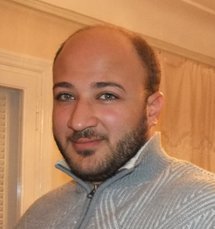
“They brought several CSF trucks to his last [court] session,” said Mohamed Mustafa Salem, Hassan Mustafa’s brother.”They are afraid of one man.”
On 21 January, Mustafa was arrested for allegedly slapping a prosecutor after going with three human rights lawyers and three activists to the Al-Mansheya court complex to check on detainees. Those detained were protesters arrested after clashes erupted following a court session during the case against police officers accused of killing protesters on 25 January. Children were among the detainees.
“I received a text message at 4am saying that some of the detainees were being interrogated without the presence of a lawyer,” explained human rights lawyer Hamdy Khalf. “A group of us, including Mustafa, went to check on them a few hours later.”
Al-Mansheya’s prosecutor on-call was Ahmed Darwish, “who denied the interrogation happened”, said activist Mahienour Al-Masry.”We were very angry because among the detained were two children, one of them 11 years old.” Al-Masry confirms that they were irritated and spoke angrily to the prosecutor, “but no one touched him; I was even angrier than Mustafa”. Darwish then told them to go to the attorney general’s office to file a complaint.
“We were there with Secretary Prosecutor Medhat Sharaf when we found out that Darwish is filing a complaint against Mustafa for slapping him,” she added.
CSF conscripts then arrested Mustafa, who received four days in provisional custody. Khalf said that he was charged with insulting and assaulting a prosecutor. His incarceration was extended and he is due to appear in court on Wednesday, 13 February. “The prosecution refused to include the testimony of the lawyers and activists who were with Mustafa every minute while he was in Darwish’s office,” said Salem. “They will testify tomorrow in court.”
Mustafa is a well-known activist in Alexandria. He was first arrested on 6 April 2008 in a demonstration supporting the Al-Mahalla workers’ strike. “He spent 21 days in [maximum security] Al-Aqrab prison before he was released,” explained Salem. “He participated in almost every demonstration against the Mubarak regime.”
Mustafa was involved in Kefaya movement protests as well as demonstrations against military trials of Muslim Brotherhood members. “He established Hashed [Mobilise] movement,” said Mohamed El-Sayes, one of his close friends. “He was also a member in the National Association for Change demanding the ousting of Mubarak and participated in the 25 January Revolution from the beginning.” He was kidnapped by State Security personnel on 6 April 2010, then sentenced to six months in jail which was reduced to one month after clashes erupted in the Al-Mansheya court in September 2010.
Following the death of Khaled Said due to severe police torture, which some view as the spark which ignited the revolution, Mustafa participated in almost every protest demanding the arrest of the officers responsible. He headed what became known as the Popular Trial of the Killers of Khaled Said (where ordinary Alexandrians issue deaths sentences to all head officers at the Ministry of Interior). His participation in Khaled Said’s protests caused further friction with the police, by whom he was beaten more than once.
Mustafa was one of the first people to discover the smuggling of papers from the State Security building in Moharam Bey on 4 March 2011 and with a group of protesters intervened to stop the process until military personnel arrived. Later the same night he was shot in the stomach and spent a night at the Military Forces Hospital. “We filed a complaint against the interior minister and a prosecutor followed up with the case and even confiscated the bullet for evidence,” said Salem, “but nothing happened.”
Mustafa works as a purchasing manager in an industrial company and has a seven month-old son.
Salem stressed that Mustafa’s family is proud of his activism and support him fully, believing that “although he is currently in jail, he is freer than those out of jail”.
Mustafa on Monday sent President Morsi a letter from his Cell number 14 at, the Borg Al-Arab Remand Prison, condemning the current injustice, promising him that his regime will fall too: “We have suffered before and during your reign. You are no Moses, but another Pharaoh, wanting nothing but the advancement of yourself and your Brotherhood.
“Justice can’t find its way to your rule; truth has no place under your government;, the oppressed find no justice in your judiciary…”
Several unsuccessful attempts were made to contact the Al-Mansheya prosecution, who were unavailable.
